Italy was the most significant part of the Roman Empire. In historiography, ancient Rome describes Roman civilization from the founding of the Italian city of Rome in the 8th century BCE to the collapse of the Western Roman Empire in the fifth century CE.
The history of Italy covers the ancient period, the Middle Ages, and the modern era. Since classical antiquity, ancient Etruscans, various Italic peoples (such as the Latins, Samnites, and Umbri), Celts, Magna Graecia colonists, and other ancient peoples have inhabited the Italian Peninsula. In antiquity, Italy was the homeland of the Romans and the metropole of the Roman Empire's provinces. Rome was founded as a Kingdom in 753 BCE and became a republic in 509 BCE, when the Roman monarchy was overthrown in favor of a government of the Senate and the People. The Roman Republic then unified Italy at the expense of the Etruscans, Celts, and Greek colonists of the peninsula. Rome led Socii, a confederation of the Italic peoples, and later with the rise of Rome dominated Western Europe, Northern Africa, and the Near East.
Ancient Italy
In the annals of time, Italy's ancient history is a captivating saga that traces its roots to prehistoric settlements during the Paleolithic era. Around 6000 BCE, vibrant Neolithic cultures emerged, laying the foundations for the rich tapestry that would become Italy. The Etruscans, a remarkable pre-Roman civilization, held sway over central Italy from approximately 900 to 500 BCE. Renowned for their advanced art, sophisticated architecture, and thriving trade networks, the Etruscans left an indelible mark on the region. The rise of the Roman Republic in 509 BCE heralded a transformative era. Marked by the Punic Wars and the gradual expansion of Roman influence across the Mediterranean, this period set the stage for the grandeur of the Roman Empire, with Augustus ascending as its inaugural emperor.
Medieval Period
As the Western Roman Empire succumbed in 476 CE, Italy entered the Early Middle Ages, characterized by the emergence of distinct kingdoms. Notably, powerful city-states like Venice, Genoa, Florence, and Milan rose to prominence, defining the feudal landscape. The Italian Renaissance, spanning the 14th to 17th centuries, stands as a zenith in Italy's cultural history. Visionaries like Leonardo da Vinci, Michelangelo, Dante Alighieri, and Machiavelli propelled the revival, showcasing unparalleled achievements in art, literature, and political philosophy.
Renaissance and Early Modern
The Italian Wars (1494–1559) brought external conflicts to Italy's doorstep, reshaping its political dynamics. Concurrently, the influence of Spanish Habsburg rule and the fervor of the Counter-Reformation left an enduring impact on the peninsula. Amidst these challenges, the tireless efforts of Giuseppe Garibaldi and Giuseppe Mazzini laid the groundwork for the Italian Unification (1815–1871). The Kingdom of Italy emerged in 1871, marking a monumental shift in Italy's destiny.
Unification and Modern Italy
The late 19th and early 20th centuries witnessed Italy's journey through industrialization, societal changes, and participation in World War I. The subsequent rise of Mussolini's fascist regime (1922–1943) would entangle Italy in the conflicts of World War II. Post-war upheavals led to the establishment of the Italian Republic in 1946. Economic prosperity, transformative social dynamics, and political realignments followed, culminating in Italy's pivotal role as a founding member of the European Union in 1957. In exploring Italy's ancient past, one unravels the intricate threads that have woven the country's diverse and enduring tapestry across millennia.

The tragic tale of Ancient Pompeii, a once-thriving Roman city nestled along the Bay of Naples, unfolds against the dramatic backdrop of the catastrophic eruption of Mount Vesuvius in 79 CE. The city was preserved in an eerie state of suspended animation for nearly two millennia. The meticulous archaeological excavations of this buried city have unearthed not only remarkably preserved structures but also the stories of its inhabitants, their lives and customs. Explore Ancient Pompeii

Ancient Herculaneum, like Pompeii, was an affluent Roman city located near Naples, Italy. Before its destruction in the 79 CE eruption of Mount Vesuvius, Herculaneum was a thriving center of Roman life, displaying the wealth and sophistication of its inhabitants. Today, the archaeological site of Herculaneum offers a glimpse into the daily lives and cultural achievements of this ancient city. Explore Ancient Herculaneum

Vatican City, the smallest independent state in the world, has a rich history deeply intertwined with its role as the spiritual and administrative center of the Roman Catholic Church. The history and archaeology of Vatican City encompass its ancient origins, Christianization, political transformations, architectural masterpieces, and the preservation of invaluable artifacts within its museums. Explore Vatican City
Situated within the ancient Greek colony of Poseidonia, modern-day Paestum, the Tomb of the Diver takes its name from the central fresco that adorns its interior. The Tomb of the Diver, an extraordinary archaeological discovery in the ancient city of Paestum in southern Italy, stands as a testament to the artistic and cultural achievements of the Greek civilization in the fifth century BCE. Unearthed in 1968 CE, this burial site, unique among its counterparts, believed to have been constructed around 470 BCE, provides a glimpse into the funerary practices and artistic sophistication of the region during this period.

Overshadowed by the infamous Mount Vesuvius, lies the lesser-known archaeological treasure of Oplontis. The ruins of Oplontis bear witness to a society immersed in the grandeur of the Roman Empire, where sprawling villas adorned with exquisite frescoes and intricate mosaics once housed the elite. Explore Oplontis
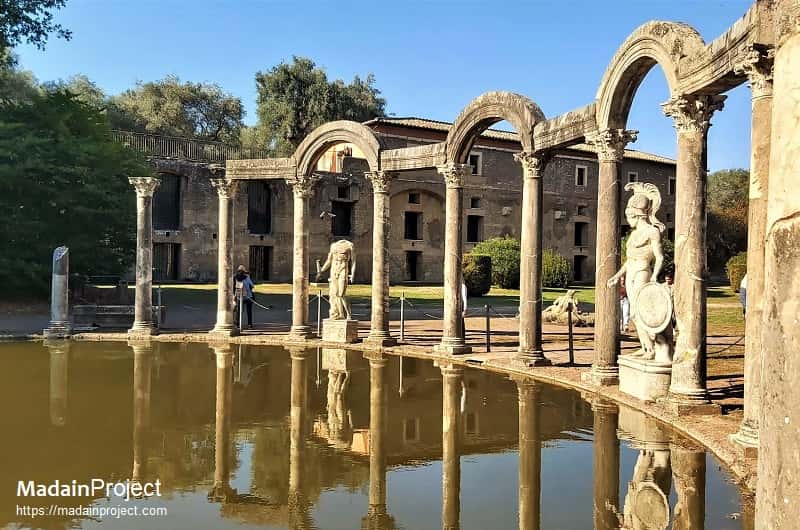
Tivoli, located just a stone's throw from the bustling city of Rome, has long been a haven of respite, offering a retreat for emperors, nobility, and travelers throughout the ages. Tivoli's landscape unfolds with the sprawling ruins of Hadrian's Villa, a testament to the imperial ambitions and architectural prowess of Emperor Hadrian during the height of the Roman Empire. Explore Tivoli

Nestled along the Tyrrhenian Sea in the Campania region of southern Italy, the ancient city of Paestum emerges from the mists of time as a testament to the grandeur of Magna Graecia. From the solemn columns of the Temple of Hera to the majestic grandeur of the Temple of Neptune, Paestum's archaeological wonders offer a compelling journey back in time. Explore Paestum
Situated near the ancient city of Pompeii, Villa Poppaea, also known as the Villa Oplontis, stands as a testament to the opulence and architectural sophistication of the Roman elite during the first century CE. This sprawling villa, believed to have belonged to Poppaea Sabina, the second wife of Emperor Nero, represents the epitome of luxurious living in antiquity. Constructed in the opulent style of Roman villas, Villa Poppaea covers a vast expanse and features well-preserved elements of classical architecture, intricate frescoes, and elaborate gardens. The villa is an exquisite blend of practical design and aesthetic beauty, offering insights into the lifestyle and tastes of the Roman aristocracy.
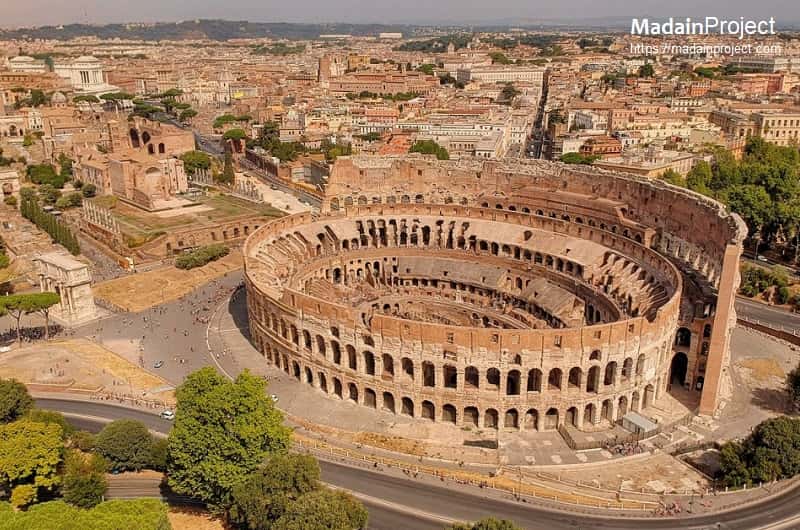
Spanning over a millennium, from its legendary foundation in 753 BCE to the fall of the Western Roman Empire in 476 CE, Rome's trajectory encompasses the evolution from a small village to the heart of a vast empire. Its history and archaeology unravel a complex tapestry of political intrigue, military conquests, artistic achievements, and societal transformations. Explore Ancient Rome

The ancient port city of Ostia Antica stands as a silent witness to the maritime prowess and economic vitality that characterized ancient Rome. Steeped in history, this archaeological gem unveils the layers of a bustling harbor town whose strategic importance was rivaled only by the grandeur of its imperial counterpart. As the primary gateway to Rome for goods and travelers, Ostia's history unfolds against a backdrop of maritime trade and diverse cultural influences. Explore Ostia Antica
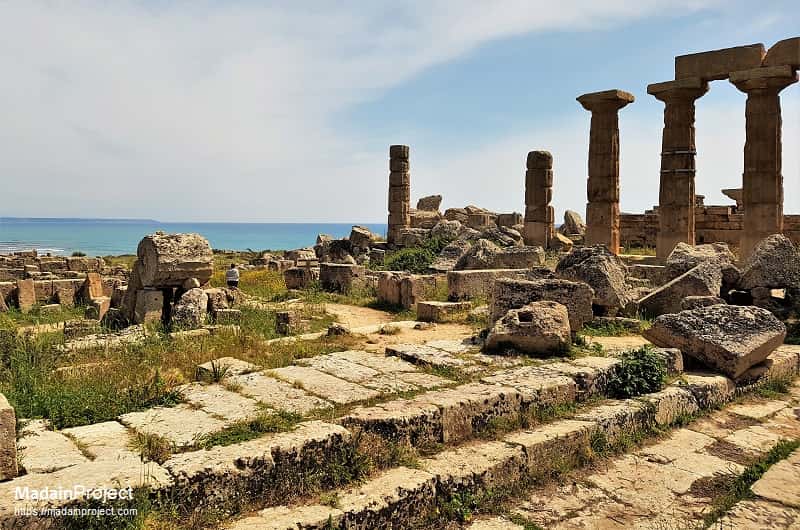
This island, strategically positioned just off the toe of Italy's boot, has been a stage for the great civilizations of antiquity, each leaving an indelible mark on its landscape. From the indigenous Siculi and Sicani to the Phoenicians, Greeks, Romans, and beyond, Sicily's history is a rich tapestry woven with threads of conquest, trade, and cultural exchange. Explore Sicily

Baiae was a renowned Roman resort city on the Bay of Naples, famous for its natural hot springs, opulent villas, and extravagant lifestyle. Favored by Rome’s elite, including emperors such as Nero and Hadrian, it became a center of luxury and leisure, with grand palaces, bath complexes, and seaside retreats. Its volcanic activity provided a unique thermal environment, making it a sought-after destination for relaxation and hedonistic indulgence. Over time, much of the city was submerged due to bradyseism, leaving behind a partially underwater archaeological site that preserves its grandeur. Explore Ancient Baiae

Antium, a prominent coastal city of Latium, was an important center in both the early and imperial Roman periods. Originally a Volscian settlement, it was conquered by Rome in the 4th century BCE and later became a favored retreat for the Roman elite. Renowned for its luxurious villas, including those of emperors like Augustus and Nero, it was particularly famous for the Temple of Fortuna and its grand harbor. Antium was also the birthplace of Nero, who expanded its structures and built a lavish imperial palace. Today, the modern town of Anzio occupies the site, with remnants of its ancient past still visible along the coast. Explore Ancient Antium

Ancient Stabiae, situated on the Bay of Naples, renowned for its luxurious Roman villas, Stabiae was a favored retreat for the Roman elite, offering stunning vistas and a tranquil environment. The area was first inhabited as early as the 7th century BCE, and over the centuries, it evolved into a bustling town known for its strategic and commercial importance. Despite its initial discovery predating Pompeii in 1749, much of Stabiae was reburied by 1782, leaving it less explored until modern excavations revealed its rich heritage. Explore Roman Stabiae
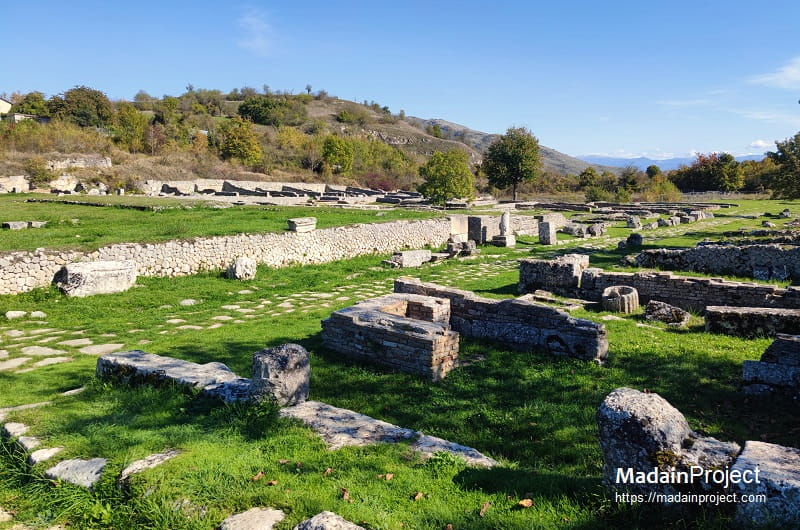
Alba Fucens was an ancient Roman colony located in present-day Massa d'Albe, Abruzzo, Italy. It was strategically positioned on a hill near the Fucine Lake (which was drained in the 19th century) and controlled important routes through the Apennine Mountains. The site features well-preserved Roman walls, an amphitheater, temples, and remains of houses and roads. Explore Alba Fucens

Cumae was an ancient Greek colony located in present-day Bacoli, Campania, Italy. It was one of the earliest Greek settlements in Italy, founded by settlers from Euboea in the 8th century BCE. The site is famous for the Cave of the Cumaean Sibyl, a prophetic priestess of Apollo, as well as its acropolis, temples, and extensive archaeological remains. Cumae played a crucial role in spreading Greek culture to the Italic peoples, including the Etruscans and Romans. Explore Ancient Cumae
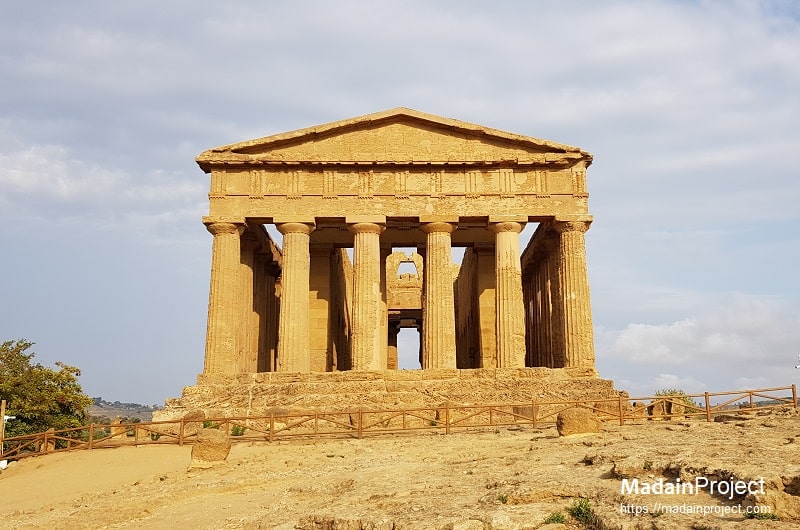
Agrigento, located in Sicily, Italy, is home to the famous Valley of the Temples (Valle dei Templi), one of the most significant archaeological sites of ancient Magna Graecia. Founded as Akragas by Greek settlers from Gela around circa 580 BCE, it became a powerful and wealthy city. The site features well-preserved Doric temples dedicated to deities like Zeus, Hera, Heracles, and Concordia, as well as ancient city walls, necropolises, and sanctuaries. Explore Ancient Cumae
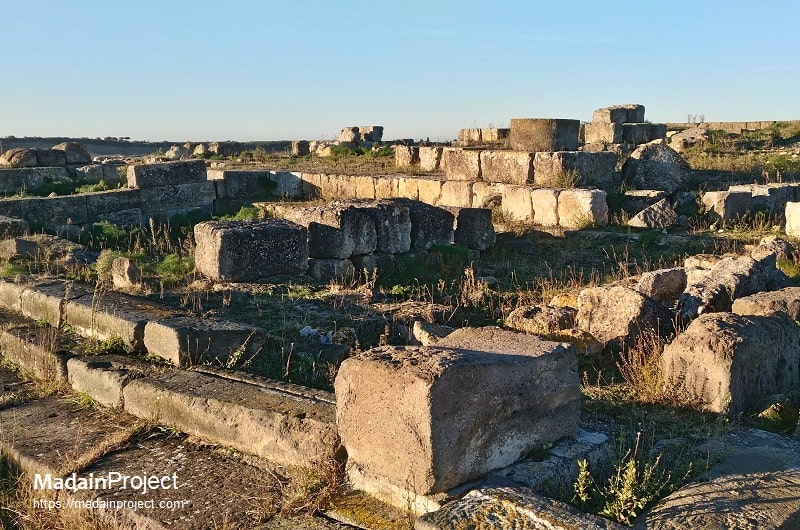
Tarquinia, located in Lazio, Italy, was one of the most significant cities of the Etruscan civilization, known in antiquity as Tarchuna. It played a major role in the political, cultural, and religious landscape of Etruria. The city is especially famous for the Necropolis of Monterozzi, which contains hundreds of rock-cut chamber tombs adorned with vivid frescoes depicting banquets, dances, and religious rituals, such as the Tomb of the Leopards and the Tomb of the Augurs. These paintings provide crucial insights into Etruscan society and beliefs about the afterlife. The ruins of the ancient city lie northeast of the necropolis and include remnants of temples, sanctuaries, and fortifications. Explore Ancient Tarquina
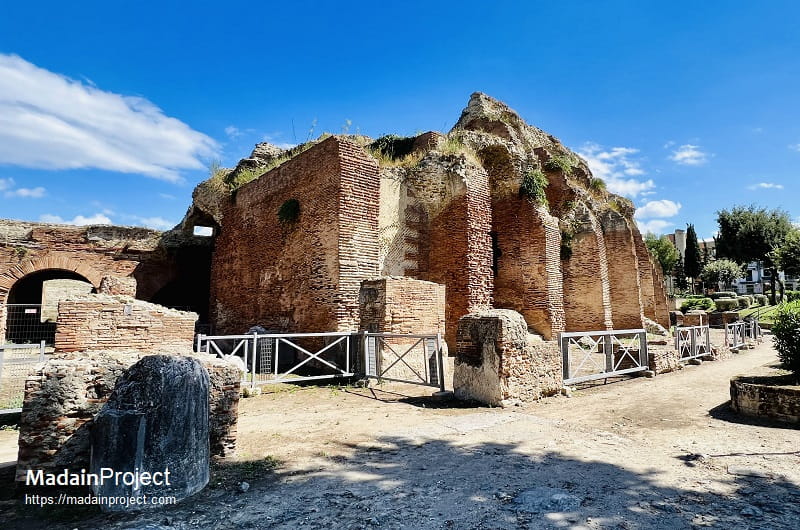
Pozzuoli, located in the Campania region of Italy, was an important Roman port city in the Bay of Naples, originally founded as the Greek colony of Dicaearchia in the 6th century BCE. Under Roman rule, it became a major commercial and naval hub, rivaling even Ostia in importance. The city is famous for its well-preserved archaeological remains, including the Flavian Amphitheater, the third-largest Roman amphitheater in Italy, which once hosted gladiatorial games. Another key site is the Macellum of Pozzuoli, often called the Temple of Serapis. Explore Ancient Pozzuoli
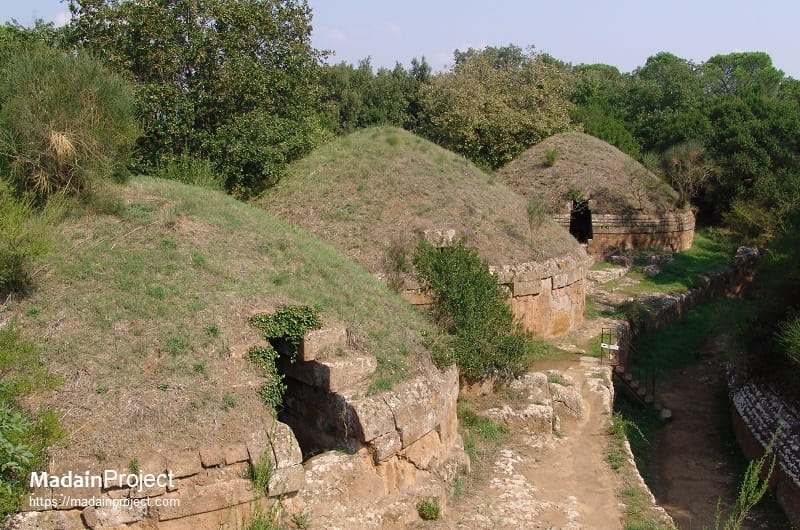
Cerveteri, located in Lazio, Italy, was one of the most powerful cities of the Etruscan civilization, known in antiquity as Caere. It was a major maritime and trading center, with strong connections to Greek, Phoenician, and later Roman cultures. The city is best known for the Necropolis of Banditaccia, one of the largest and most significant Etruscan burial sites. The necropolis features a variety of tomb types, including tumuli, rock-cut chamber tombs, and house-shaped tombs, reflecting Etruscan architectural styles and social hierarchy. Explore Ancient Cerveteri
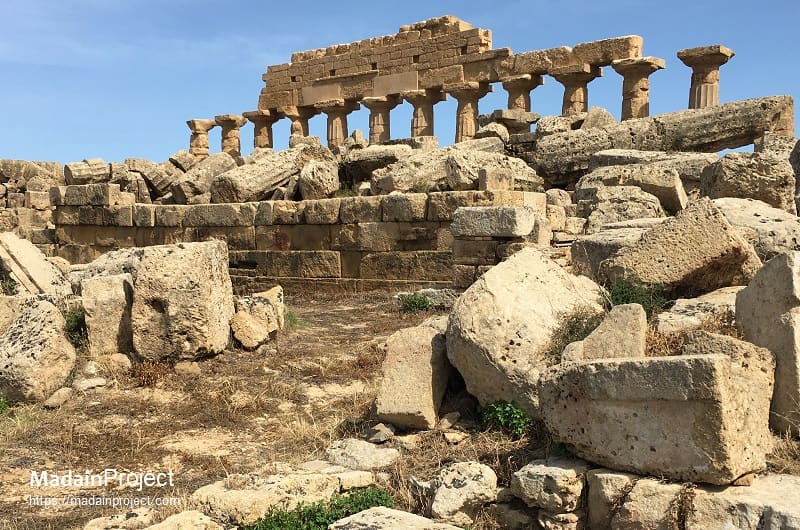
Selinunte, located in southwestern Sicily, Italy, was one of the most powerful Greek colonies in Magna Graecia, founded in the 7th century BCE by settlers from Megara Hyblaea. The city flourished due to its strategic coastal position and agricultural production but was in constant conflict with neighboring cities, particularly Segesta. In 409 BCE, it was devastated by the Carthaginians, leading to its decline. Explore Ancient Selinunte
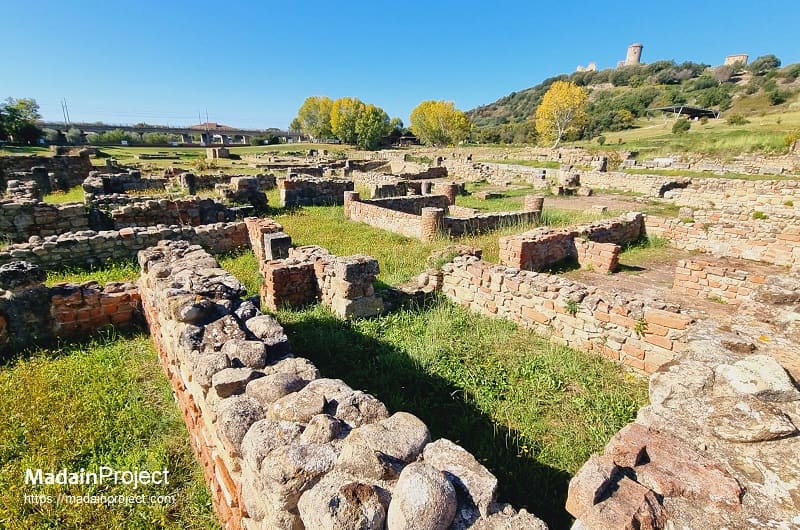
Velia, located in southern Italy's Campania region, was an ancient Greek city originally founded as Elea by Phocaean settlers from Asia Minor around circa 540 BCE. It became famous as the home of the Eleatic school of philosophy, founded by Parmenides and later developed by Zeno of Elea. The city played a significant role in Magna Graecia, maintaining its independence for much of its history before becoming part of Rome. Explore Ancient Cumae
Signup for our monthly newsletter / online magazine.
No spam, we promise.